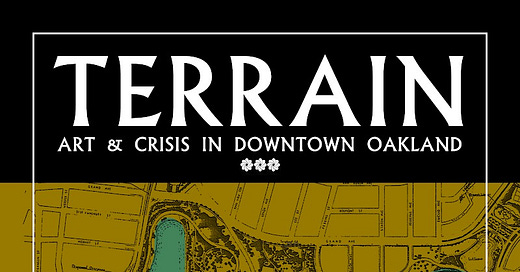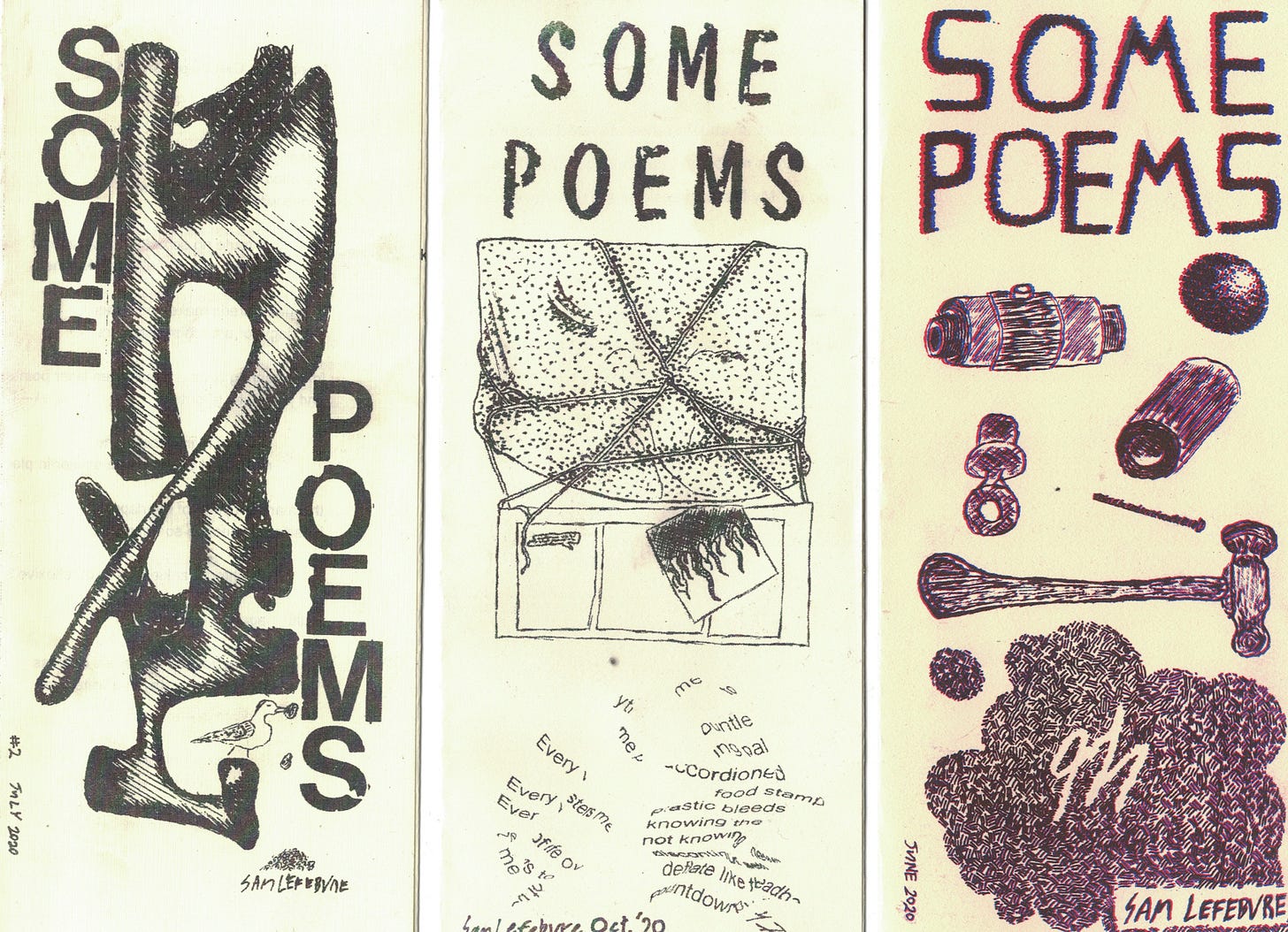Backbeat: Below the street, a creek
Terrain: Art & Crisis in Downtown Oakland, Dragged Through the Garden, Some Poems
Lake Merritt overflowed in October. I was there, canvassing with the tenant union, when entire walkways flooded and brackish water drowned the lawn. The only reporting I found about it was in The Tidings, a monthly, printed-and-tacked newsletter by the volunteer organization Lake Merritt Institute (there are also PDFs online), alongside a mystifying photo of a couple Lake Chalet diners on deck stools, seemingly unbothered by the water at the base of their table.
Alameda County is in a flood plain. Until the 1960s, much of the region often flooded. It wasn’t a disaster, like the word implies. It was just the grid we know as the flatlands breathing water. The Alameda County Flood Control & Water Conservation District regulates this respiratory system today. The 72-year-old public flood control agency plans, designs, constructs and maintains the creeks, channels, levees, pump stations, dams and reservoirs of western Alameda County.
According to The Tidings, county flood officials accidentally left open both of the 7th Street floodgates during high tide; normally, when the tide exceeds 6.5 feet, they close both of the gates. So the flood wasn’t directly caused by sea-level rise, as I assumed. It was a failure of tidal suppression infrastructure: Flood officials use underground, manually-operated pumps to allow tidal fluctuations—which improve water quality and biodiversity—while preventing overflow.
The incident reminds me of a few things. The controls shaping what appears to be natural. The politics of the watershed; the flood agency, like many public entities, is underfunded, and volunteers supplement and often carry out its work. As sea-level rise does threaten massive capital destruction (see Brooklyn Basin), what does the privatization of flood control look like? Overall, like most things lately, it shows how systems become more legible as they start to fall apart.
That’s a key theme of Terrain: Art & Crisis in Downtown Oakland, a print publication I edited as a writer-in-residence at Pro Arts Gallery & COMMONS. The publication features local artists, writers and organizers reflecting on the built-environment and their practices, particularly turning to mutual-aid, during a year of alienation, privation and unrest. Everyone contextualizes their work in the failures of the racial capitalist system to provide a livable, affordable Oakland.
I contributed an introduction essay looking at the turn to mutual-aid in part as a reaction to the atomizing effects of the financialized, nonprofit arts establishment. I also wrote a polemic about public protest art, showing how the landlord and merchant counterinsurgency used sanctioned murals to influence cultural production related to the summer uprising. And in one of a few short Mutual Air responses I describe another, little-noticed infrastructural failure this year at Lake Merritt.
This has been one of my main projects lately. It’s a welcome return to something like the self-publishing that once defined my writing life. Thank you contributors alex cruse, Moments Cooperative & Community Space, Julian Francis Park, Queers United in Community Care, We Are the Ones We’ve Been Waiting For, Brian Bartz and Phillip Greenlief; designers June Little Soldier and Dio Brooks; printer Mollie Underwood; and Pro Arts’ director Natalia Mount.
The multicolor risograph publication—44 pages plus an insert, featuring a conversation between the printers—is available now for preorder, and will be available on a donation basis as a PDF. Let me know if you’d like to help distribute or whatnot.
A recurring flashback: Bicycles locked to a fence, stacked and overlapping, some slung from the top-most part of the frame by their handlebars. It was an inviting, familiar sight outside any number of West Oakland house venues, signaling a yard and rooms beyond teeming with people, that I associate with the Swamp, World Rage Center, LCM, ABCO, the Hive. Usually, at that point, you could hear chatter and clattering warmups, often vying with some freeway noise.
The flashback surfaced around announcing Dragged Through the Garden, the new full-length by Max, Alejandra and I as Preening. After much delay, and without tour dates to go along, it feels incomplete, or a little anticlimactic, like watching one balloon float off, especially because it coincided with Max moving to Olympia. We tried to restore some sense of collectivity to the event by jointly authoring a statement. Max and I dumped some thoughts in a shared document, and Alejandra recorded herself reflecting on the record as she listened to it. Some composite of these words follows:
"The three of us recorded Dragged Through the Garden in two sessions, on either side of a 2019 nationwide tour, under a skylight magnifying glass with Andy Human and Brett Eastman. I was soaked with sour perspiration. I’m gonna listen and I’m gonna talk and I’m gonna paint my nails. I never stopped trying to make my part less swinging. We sensed that voice, percussion and single-line instruments could make us whole? It sounds like little bug hands on the ground, scamper, skitter, scatter. I never really did music before Preening, a little here and there. Recall our earliest inclinations—associated with the Oakland warehouse where we formed, now offices to craven real-estate speculators—towards compact, spring-loaded statements. It’s got a lot of kick; it’s got good chew. So this new device demoted and defaulted most of my performances to the ignorant variety. The layers of dry paint on the wall—a folk punk kuato named scoby. The songs accreted feeling from people in rooms of a similar size and interdependent atmosphere."
I’m in my third session of Elaine Kahn’s Poetry Field Workshop. It’s been an anchor, like the reading group through my tenant union local, providing a semblance of connectedness, however mediated. I don’t have a degree of any kind or any experience in creative writing workshops. So even the standard workshop format, with people taking turns giving feedback, suggesting edits, and the writer mostly listening, is eye opening. I like incorporating edits that change the whole meaning so that the poem contains more subjectivities. I’ve made a few poem pamphlets with illustrations, good motivation to keep drawing. Let me know if you’d like to get the next one in the mail.







Would love a poem pamphlet and just pre-ordered Terrain!